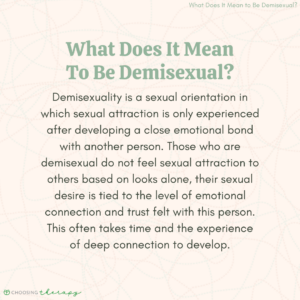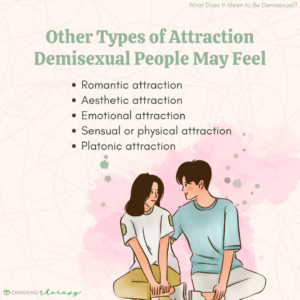Demisexuality is a sexual orientation in which sexual attraction is only experienced after developing a close emotional bond with another person. Those who are demisexual do not feel sexual attraction to others based on looks alone, their sexual desire is tied to the level of emotional connection and trust felt with this person. This often takes time and the experience of deep connection to develop.
Talkspace - Online Counseling For the LGBTQIA+ Community See a licensed therapist who sees you! Covered by most insurance plans. Visit Talkspace
What Is Demisexuality?
Emotional intimacy and trust can only be developed over time, and as such, it may take demisexual individuals a longer time to feel sexual attraction and desire sexual activity in a relationship than the average person. Friendship usually comes before a sexual relationship for those who are demisexual. However, being demisexual is different from just preferring to sleep with people whom you’ve known for a long time, because the connection must be characterized by a deep level of emotional intimacy and closeness.1
Demisexuals can be gay, straight, bisexual, or pansexual. Being demisexual refers to the intensity of emotional connection needed before feeling sexual attraction to another, but is not defined by the gender to which the individual is attracted to. You can be demisexual and attracted to any other gender (e.g., males, females, nonbinary people, and transgender people).
Demisexuality vs. Asexuality
Demisexuality can be confused with asexuality, as both are characterized by a below-average level of sexual drive. Those who identify as asexual do not experience sexual attraction or a sex drive towards anyone. Those who are demisexual do experience sexual attraction and drive, but only after developing a close relationship and trust with a potential sexual partner. As such, a demisexual individual may appear to be asexual until a close emotional bond is formed, under which conditions they may experience sexual attraction and choose to engage in sexual activity.
Common Misconceptions About Demisexuality
Like most LBGTQ+ identities, there are myths and misconceptions surrounding demisexuality.
Some common misconceptions about demisexuality include:
Demisexual People Have Low Sex Drives
One common misconception about demisexuality is that demisexual people have low sex drives. While this may be true for a period of time, before a close emotional connection is formed with another person, demisexual folks actually do develop a sex drive after developing trust and emotional safety with another. At this point in the relationship, demisexual folks may experience any level of sex drive ranging from low to high.
Demisexual People Are Prude
Another common myth about demisexuality is that those who identify as this sexual orientation are “prude” in some way. Merriam-Webster’s dictionary defines a prude as, “a person who is excessively or priggishly attentive to propriety or decorum, especially : a woman who shows or affects extreme modesty.”2 Those who choose or prefer to stay away from all sexual activities may be labeled as prude by others. There is absolutely nothing wrong with choosing to delay or abstain from sexual activity for any reason, this is simply a personal choice and there are a variety of reasons that people may do this.
Those who are demisexual simply require a strong emotional bond before experiencing sexual attraction, and at that point may be gung-ho about any form of sexual activity, and can sometimes be quite adventurous in their sexual exploration with another individual. Those individuals whom others might label as prude may experience sexual attraction, but choose not to act on it out of a variety of personal, cultural, or religious reasons, and these are personal choices that should be respected and not criticized or labeled.
Demisexual People Need to Be in Love to Have Sex With Someone
Some people believe that being demisexual means that being in love with someone is required in order to have sex with someone else or experience the desire to have sex. This is not necessarily true. While a strong emotional connection is required for a demisexual person to experience sexual attraction, this connection doesn’t have to necessarily be “being in love.” Some demisexuals experience sexual attraction in close friendship relationships, or during the period when a close emotional connection is formed but before the experience of “being in love.”
Top Rated Online Therapy Services BetterHelp – Best Overall “BetterHelp is an online therapy platform that quickly connects you with a licensed counselor or therapist and earned 4 out of 5 stars.” Visit BetterHelp Talkspace – Online Counseling For the LGBTQIA+ Community See a licensed therapist who sees you! Covered by most insurance plans. Visit Talkspace
How Does Demisexuality Work in Relationships?
A relationship involving a demisexual individual might look different from your average relationship. This person will likely prioritize building a strong emotional connection based on shared values, vulnerable self-disclosure and deep listening, and truly seeking to know another in an authentic and honest way before exploring a sexual relationship.
The demisexual person will likely take a physical relationship slower than others, allowing time and emotional experience to build a strong connection before engaging in sexual activity of any kind.
Demisexual individuals may enjoy nonsexual touch such as cuddling, holding hands, and possibly kissing, before desiring to or going to more sexual forms of touch. Demisexual individuals are often genuine, kind, caring, and emotionally intelligent people who value strong emotional bonds and their partner’s inner beauty.
Can Demisexual People Experience Other Forms of Attraction?
While demisexual people don’t experience sexual attraction to people they don’t know well and feel emotionally safe and connected with, they can experience other types of attraction.
Other types of attraction demisexual people may feel include:
- Romantic attraction: Demisexuals may experience romantic attraction before experiencing sexual attraction. This means that while they do not experience the desire for sexual activity with this person, they may experience feelings of excitement about forming a romantic relationship with this person and a desire for a close and intimate emotional bond that goes beyond that of a friendship.
- Aesthetic attraction: Demisexuals can also experience aesthetic attraction, which is the acknowledgement of physical beauty in the other, without experiencing a desire to act on that attraction with sexual activity.
- Emotional attraction: Emotional attraction, the experience of emotional intimacy– which is not necessarily tied to romantic or sexual feelings (and can be felt in the context of a friendship or a romantic relationship) – can also be experienced by those who are demisexual before experiencing sexual feelings.
- Sensual or physical attraction: Demisexual individuals may feel a sensual or physical attraction to another, such as the desire for non-penetrative sex including cuddling, holding, touching, or caressing another, but without the desire to go further and participate in more sexual activity with others, before a strong emotional bond is formed.
- Platonic attraction: Individuals who identify as demisexual can also feel platonic attraction first, or the desire to form friendship with another person, before they feel sexual attraction.
Therapy is a safe place to explore your sexuality. BetterHelp has over 20,000 licensed therapists who provide convenient and affordable online therapy. BetterHelp starts at $65 per week. Take a Free Online Assessment and get matched with the right therapist for you.
Am I Demisexual?
If you think you may identify as demisexual, here are some questions to ask yourself:
- Do you find it perplexing that others enjoy and engage in casual sex?
- Do you often find that partners are ready for sexual activity sooner than you are?
- Do you rarely feel sexual attraction for strangers, regardless of how physically attractive you find them?
- Does it take you a long time and a deep emotional connection to start to feel sexual feelings toward someone else?
- Do you need a high level of emotional safety and trust with someone before wanting to engage in sexual activity with them?
- Have you ever experienced romantic attraction to someone but absent of sexual attraction, until the connection grew to a certain level?
How to Talk to Your Loved Ones About Demisexuality
If you decide to come out as demisexual to your loved ones, the first step is deciding who you would like to tell. Who do you feel that it would be important to tell about your sexual orientation of demisexuality? You may choose to tell potential romantic or sexual partners, friends, or family. Next, it is a good idea to learn everything you can about demisexuality through your own research, so that you can help others understand from a place of knowledge and educate your loved ones about what demisexuality is, along with what it means to you.
If you feel that you identify as demisexual, it is entirely up to you who you choose to tell. You may choose to keep this information private and for yourself only, or you may choose to help others in your life understand your demisexuality. Coming out as demisexual is a person’s own decision and their own business. No one can or should make this decision for you.
When to Seek Professional Help
If you find that you need emotional safety, trust, and a deep emotional connection before sexual feelings arise for you, it’s possible you could identify as demisexual if you choose to. If you are feeling confused, unsure, or just hoping to explore your sexuality and your identity more, it may be a good idea to reach out to a trusted friend or loved one, or find an LGBTQIA+ therapist.
For convenience, there are online therapy platforms and you can use an online therapist directory to help you choose a therapist, counselor, or psychologist that fits your needs.
In My Experience
When you come out as demisexual, using a direct but gentle communication style is best. Explain that you want to share this information because of how important this person is to you, and share what demisexuality means to you. You can also share what you need from this person, such as support or understanding for your identity or some other kind of help such as helping others understand, too. Using “I statements” and a calm tone are always good communication skills to use, and especially around vulnerable topics such as these.
Remember that you can control how you tell others in your life, but their reaction is their responsibility and not yours. For personal reasons that have nothing to do with you, some people may not understand or support your identity. Remember to avoid taking these reactions personally, and reward yourself for being honest and authentic with who you are, regardless of the uncertainty of whether others will understand or not. This is a brave step, and you should be proud of yourself for doing it!
It’s a good idea to set aside a time when you are feeling centered and prepared to tell your loved ones. If needed, practice some self-care before initiating this conversation such as participating in an activity that brings you joy (for me, that would be singing along to my favorite songs in my car!), treating yourself to a delicious but healthy meal, moving your body to relieve stress, or relaxing with a bubble bath or some rest in whatever way works for you. You may feel more at ease if you choose an environment to tell others that makes you feel safe, such as in your home or outside at your favorite park.
To help our readers take the next step in their mental health journey, Choosing Therapy has partnered with leaders in mental health and wellness. Choosing Therapy is compensated for marketing by the companies included below. Online Therapy BetterHelp Get support and guidance from a licensed therapist. BetterHelp has over 20,000 therapists, who provide convenient and affordable online therapy. Complete a brief questionnaire and get matched with the right therapist for you. Get Started Psychiatry, with you in mind Talkiatry Our Psychiatrists Can Diagnose Your Condition, Prescribe Medication, And Monitor Your Progress. Most psychiatry visits cost patients $30 or less* Free Assessment Drinking Moderation Sunnyside Want to drink less? Sunnyside helps you ease into mindful drinking at your own pace. Think lifestyle change, not a fad diet. Develop new daily routines, so you maintain your new habits for life. Take a 3 Minute Quiz Relationship Help OurRelationship (Free Couples Course) OurRelationship has been proven to help couples improve communication, intimacy, and trust. 94% would recommend it to a friend. Get Started Mental Health Support Group App Circles Anytime, anonymous, and free. Never feel alone during life’s greatest challenges. Drop-in to live conversations and share thoughts, ask questions, or learn from others on the same journey. Join Circles Now Mental Health Newsletter A free newsletter from Choosing Therapy for those interested in mental health, therapy and fighting stigma. Sent twice weekly. Sign Up Choosing Therapy Directory You can search for therapists by specialty, experience, insurance or price, and location. Find a therapist today. *Includes all types of patient cost: copayment, deductible, and coinsurance. Excludes no shows and includes $0 Visits.Additional Resources
Online Anxiety Test A few questions from Talkiatry can help you understand your symptoms and give you a recommendation for what to do next. How Does ERP Help With Intrusive Thoughts? Obsessive compulsive disorder (OCD) is a psychiatric condition marked by the presence of obsessive thoughts, images, doubts, or urges, followed by compulsive behaviors or acts aimed at easing the distress caused by the obsession. While the content of the obsessions can take many forms, they are always repetitive, persistent, involuntary, and intrusive, and they often result in a great deal of anxiety for the person experiencing them.








